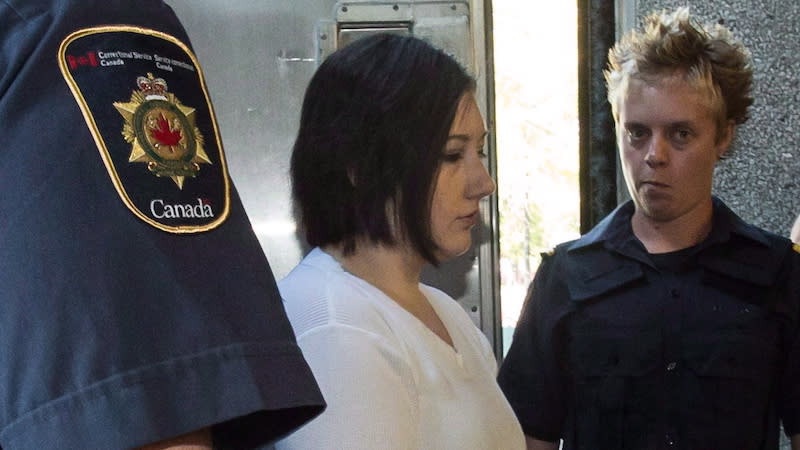Child killer's healing lodge transfer leads Ottawa to change rules on prison moves

The woman who killed 8-year-old Tori Stafford in a field nine years ago is back in a traditional prison after spending most of 2018 in an Indigenous healing lodge.
Terri-Lynne McClintic was convicted in 2010 of first-degree murder and sentenced to life in prison for her role in the kidnapping, rape and murder of Stafford with her boyfriend in Woodstock, Ont., in April 2009.
Just eight years into her 25-year prison sentence, Correctional Service Canada transferred her from the Grand Valley Institution for Women in Kitchener, Ont., to the Okimaw Ohci Healing Lodge in Maple Creek, Sask.
Public backlash forced the federal government to act. The victim’s father, the federal Conservatives and even the Indigenous community that houses the healing lodge expressed concern with the move. In response, the ruling federal Liberals agreed to move McClintic from the lodge to the Edmonton Institute for Women — a minimum, medium and maximum security prison.
McClintic was transferred late on Nov. 7, 2018 — the same day as the announcement. Tori Stafford’s father, Rodney Stafford, shared the news on Facebook the next day. He wrote:
“IT’S OFFICIAL!!!!! TERRY-LYNN IS BACK BEHIND BARS!! WOOOOOOOOOOO HOOOOOOOOOO!!!!!!”
McClintic had been living at the healing lodge — a minimum-medium security facility where offenders live in residential units with a bedroom, bathroom, kitchenette and living room. She had been there for nine months when the victim’s father learned of her transfer there.
Stafford said it was mentioned in a discussion with Correctional Service Canada about a parole board request by McClintic for additional day leaves. He said the news left him feeling angry, re-victimized and let down by Canada’s justice system, so he quickly attempted to gain public support for a reversal of the transfer.
“I would have been totally fine if Terri-Lynne had gone in, done her time, did the programs she needed to rehabilitate her life the way you’re supposed to in an institution,” Stafford told Yahoo Canada. “And if we had been able to have our say and just be a part of things.”
When the transfer was reported by the London Free Press on Sept. 25, 2018, it sparked outrage across the country. Yahoo Canada polled readers on whether or not McClintic should be allowed to remain in the healing lodge, and out of the more than 10,000 responses, only 220 said she should.
Rally leads to change
On Sept. 28, 2018, Stafford appealed in an open letter to Prime Minister Justin Trudeau to have McClintic returned to the Grand Valley Institution for Women in Kitchener. By then, news of the transfer had reached the highest levels of government, where it became a new point of contention between the Liberals and the Conservatives.
On Nov. 2, 2018, Stafford led a rally on Parliament Hill to protest the transfer, as well as any future transfer of a child murderer to a lower-security facility.
Days later, he got the news he’d been waiting for.
Now, not only will McClintic serve out the rest of her sentence in what Canadians recognize as a traditional prison, but federal prisoners serving long sentences can expect the same treatment.
In addition to reversing the transfer, Public Safety Minister Ralph Goodale announced new rules on Nov. 7, 2018, that will make it harder for federal prisoners serving long sentences to secure transfers to healing lodges.
Under the new rules, prisoners won’t be eligible for transfers to institutions without secured perimeters until they’re in the “preparation for release” phase of their sentences.
The Correctional Service of Canada will have to consider inmates’ behaviour before transferring them, and deputy commissioner for women will provide oversight for each case, ensuring national standards are applied consistently. How close an inmate is to being eligible for an unescorted temporary absence will also be considered.
“These changes will help ensure the public’s confidence that our correctional system is holding guilty parties accountable for breaking the law,” Goodale said. “While fostering their rehabilitation, so we can have fewer repeat offenders, fewer victims, and ultimately, safer communities.”
Goodale said healing lodges will continue to play an important, evidence-based role in the federal corrections system, and Indigenous communities will be consulted before any future transfers are made.
“By providing effective, culturally responsive interventions, [healing lodges] promote the safe and successful rehabilitation of Indigenous offenders,” the minister said. “Our government will continue promoting their valuable role in federal corrections.”


